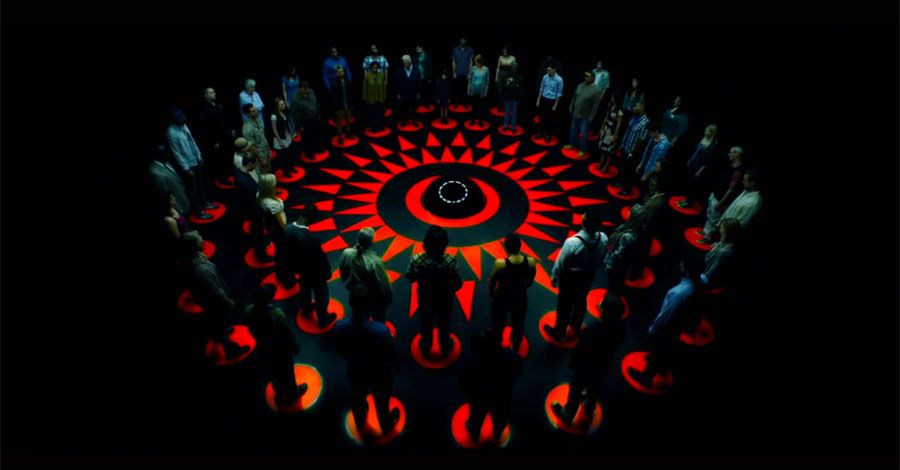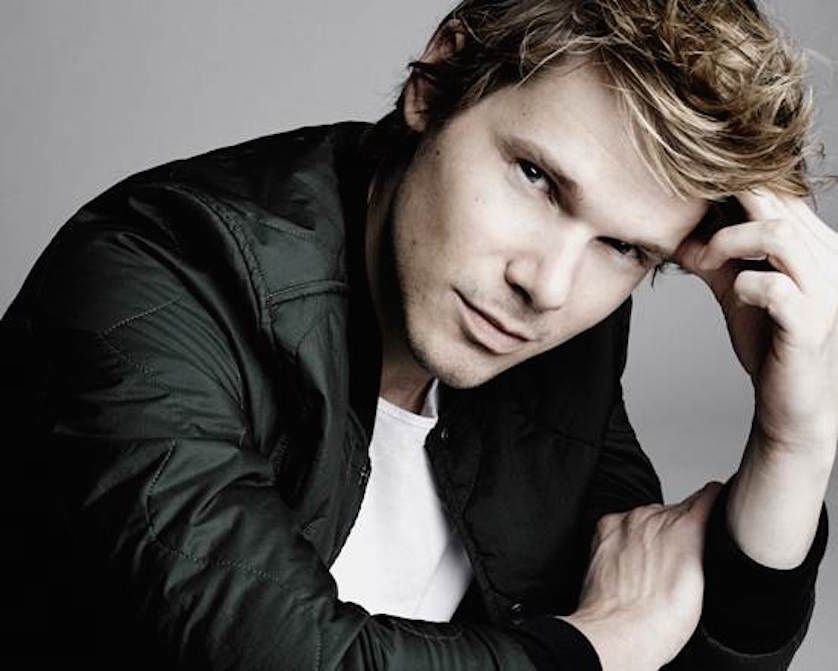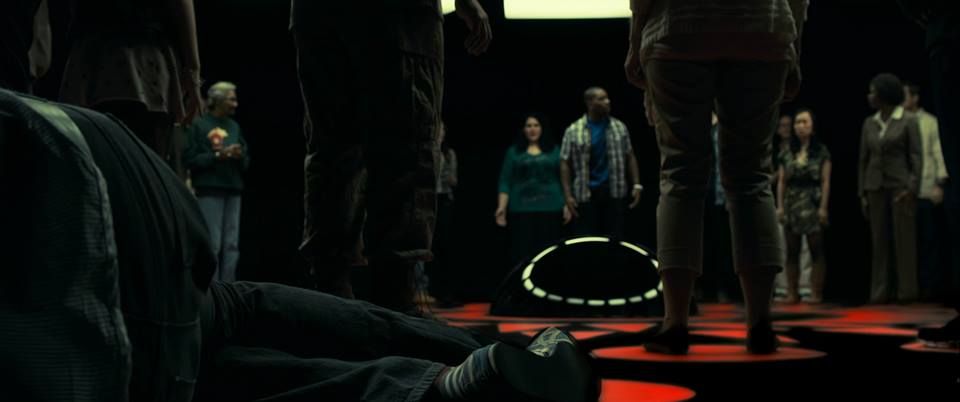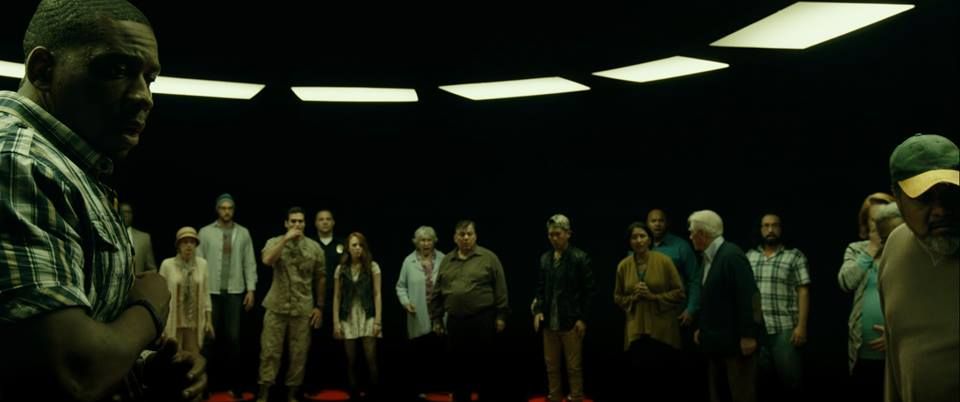Who dies next?
That's the horrifying question posed to a group of captives in "Circle,” the psychological thriller directed by Aaron Hann and Mario Miscione (“The Vault”).
In the film, 50 strangers wake up in a chamber with no recollection of how they arrived there. Immobile and organized in a circle, they’re pawns in a lethal game in which one of them is executed every two minutes by a strange device in the center of the room. Although the attacks initially seem random, the prisoners soon decide they possess the power to choose who lives and who dies.
With the arrival of "Circle" today on VOD and Netflix, SPINOFF spoke with star Michael Nardelli ("The Collection") about its cerebral horror, shooting in real time, and the importance of delivering answers in a film.
Spinoff: This isn't your first horror movie. What do you enjoy about the genre?
Michael Nardelli: I watch so many horror movies. For me, there are two kinds: There's the smart, elevated horror like "Sixth Sense" and "The Others." I think "Circle" fits into that. Not that it's super-smart, but it's more cerebral. Then I love "Friday the 13th," where you laugh a little more than you should. They have a little bit more of a B sense of humor. I grew up on "Halloween," which is one of my favorite horror movies. Horror movies are great to watch as a communal experience with friends because it's so interactive. People scream. They laugh. When I saw "Insidious," it was a great experience. You just don’t get to do that in a drama or other kinds of movies. It's so intoxicating when you watch a good horror movie.
Was it a blast meeting a gory demise in "The Collection”?
I loved dying. I got to push the button that exploded the blood. Basically, I had to kill myself. It was almost like dynamite. Blood sprays all over you. A good death scene is the upside of being a victim.
When you received the script for "Circle," what grabbed you about the premise?
When directors/writers Aaron Hann and Mario Miscione were pitching it to me, I loved the concept instantly. "Oh, I would totally watch that." I don't do that with everything I read as an actor. With this, the basic concept is 50 people wake up in a chamber. Every two minutes, one of them gets killed. It turns into much more of a political/social/psychological commentary on how these individuals interact. I knew there was more going for it than just a kill count.
Why does having a film set in a self-contained space make for an intense story?
When you confine people into a chamber or a room, especially when there's 50 people in one room, it's just like in life where you get so many different opinions. You get conflict. You get laughs. It's scary. It creates a good melting pot for who people really are when you are stuck together. Even all of us actors were all on camera for any given shots. You can't really phone anything in. You can only fake it for so long. The one-room genre, I guess they are calling it “chamber horror,” exposes humanity for what it is, good or bad.
So, how does this pressure-cooker situation bring out the best and worst in people?
Midway through, they find out they are actually in charge of who is getting eliminated next. They find out they are voting. That's really the trigger for a lot of true colors to come out and a lot of different strategies. All of the characters are basically fighting for their lives, so it brings up a lot of, "How do you value a human life? Do you value it based on how much somebody made in a given year? How much notoriety do they have? Do you value them because they are a parent? If they are a single parent, does that make them not as valuable?" With 50 people, it's people of all different ages, ethnicities and sexualities. It brings up a lot of topical issues we're dealing with nowadays, which is another thing I loved about the story. It's definitely a thriller, but it addresses things like racism, gender equality and class.
Are there one or two characters that stand out from the crowd and rise to the occasion?
It starts off with a lot of archetypes because there are 50 people. In the first 15 minutes, you don't really get to know anyone too well, but you understand, "That's the lawyer, that's the doctor, the pregnant girl and the 8-year-old girl everyone is going to instinctually want to protect." Every two minutes, one of them gets eliminated. As you get to the midpoint of the movie, there definitely are 10 to 15 people you really get to know and follow. From that point on, the eliminations get a little more personal because you've identified with certain people. Some people you want morbidly to die because they are bad people. Some people you want to protect. Like life, not all the votes make sense. There are some moments where you're like, "Why her? She was quiet. She didn’t do anything. Why would you get rid of her?" There are definitely some characters you bond with.
What was the rationale behind making the deaths occur in two-minute intervals?
I never asked Mario and Aaron why it was specifically two minutes. I think structurally it gave you enough time to have some dialogue and interaction, but it also kept the pace going. You are in one room for most of the movie. I think it had to do with pacing and still allowed time to get to know this character or that character.
How challenging was it pulling this movie off in real time?
In terms of shooting, it was great because we got to film it in order, which was awesome for the actors because you never really get to do that. It made certain things easier because, continuity-wise, it would have made it impossible to not do it in order. And because we were in one dark room, we were actually able to do it.
In terms of real time, it made editing really tricky. You want to get all the moments within two minutes. Truthfully, not every segment is perfectly two minutes, but it all does take place in 87 minutes. It was hard to cut things out that needed to be there character-wise. We always felt it should be a 90-minute thrill ride and not one of these two-and-a-half-hour odysseys into the human mind. The real time gives it a twist that most movies don't have, but it was a nightmare for the editors.
How important was it to answer questions like, "Who is responsible for this ordeal? Why is he doing this?"
There are different opinions on this. Somebody at a screening was grateful we have more of a "period" on the end of this movie rather than a "…" or a "dash." I love the movie "Cubed," but it ends pretty abruptly. We've all seen those sci-fi movies that end with more questions asked than are answered. "Circle" has more of a definitive ending to it, which I prefer. Nowadays, it's more of a bold statement. "This is what happened. We're not leaving you to figure out some ambiguous ending." There are still lingering questions and mythology that can be answered if there are subsequent "Circles" -- or "Rhombuses" or "Triangles." I like the idea of giving the audience an answer after 90 minutes.




